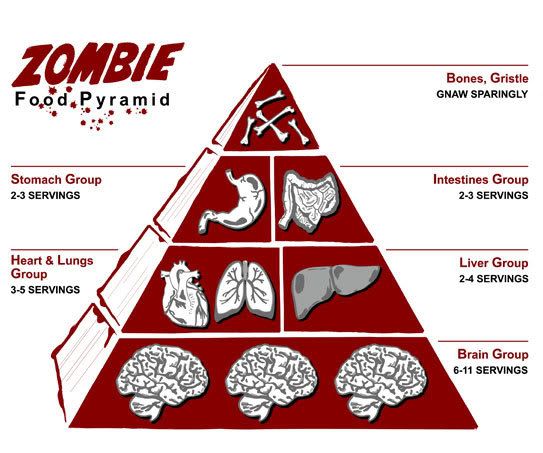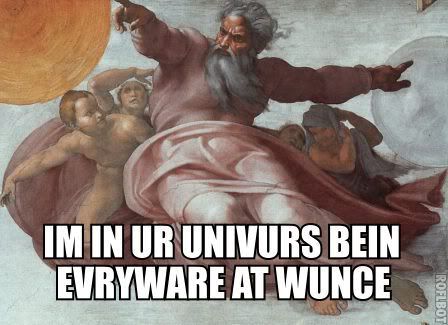Curiously, there really is a Roscoe's in SoCal and it is, apparently, a fairly popular place to go. This factoid blows my mind.
Tuesday, July 31, 2007
Unstructured Chicken and Waffles
Curiously, there really is a Roscoe's in SoCal and it is, apparently, a fairly popular place to go. This factoid blows my mind.
Unstructured Archetypes: The Sinful Woman
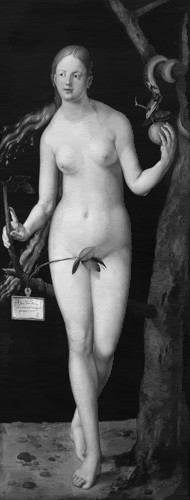
She is Eve. She is Guinevere. She is Helen of Troy.
She is always a woman and never a man.
She Sinful Woman is not Evil; she is Flawed. The difference is important.
The Sinful Woman is the Hero’s One True Love. (Because of her sinfulness, however, he may eventually find his Other One True Love).
Because of her sinfulness, she destroys herself and those who love her.
Her sin is sexual. Her downfall is her desire for Carnal Pleasure. She confuses carnality for love and it is this confusion that causes her to betray the Hero.
The sinful woman is repentant. However, even if the Hero forgives her, she remains Flawed.
The Hero continues to love her, even after she has Fallen.
The Sinful Woman is usually childless. If she does have children, she passes to them a Flawed Legacy.
The Sinful Woman has a choice. She knows that her actions are sinful but she does them anyway.
Although the Sinful Woman will commit adultery, she is neither a slut nor a whore.
The Sinful Woman is beautiful. Her beauty is a reminder that virtue is more important than appearance.
The Sinful Woman believes in God. She just falls short of him.
Labels: Archetypes, Sin, Women
Monday, July 30, 2007
Ingmar Bergman, RIP
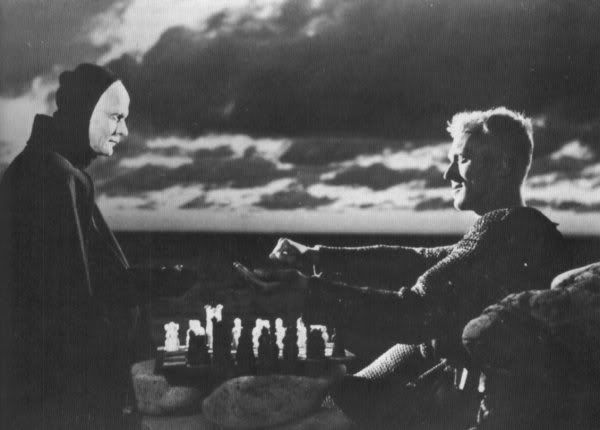
I would seem that Swedish film maker and auteur Ingmar Bergman has finally lost the Great Chess Game at the venerable age of eighty-nine.
I think that this is a perfect opportunity to suggest that you go out and rent a copy of The Seventh Seal, which is largely regarded as his magnum opus.
The Seventh Seal is the story of a knight returning from the Crusades during a time of plague. Early in the film, he encounters Death (a scene often parodied, as with Budweiser's "Sad Clown of Death") who challenges him to a game of chess. What follows is something that is simultaneously meditative, poignant, wry, thought provoking and beautiful
If you're worried that it's going to be just another incomprehensible foreign film, I will assure you that it's perfectly accessible and very easy to enjoy and appreciate. To be sure, it is a deeply philosophical movie and, given that the topic is death and the meaning of life, it isn't what I would call light; never the less, unlike too many supposed classics, it's not the sort of film that tries to prove to the audience that the director is so much smarter than they are by way of baroque and pointless complexity. Indeed, the plot is remarkably straightforward.
Labels: Ingmar Bergman, Obituary, The Seventh Seal
Unstructured Archetypes: The Sidekick

He is Tonto. He is Robin. He is Morningglum. He is Samwise Gamgee.
He can be a woman, but only if the Hero is a woman. Heroes don’t have co-ed sidekicks.
He is either younger than the Hero or of a lower social caste (or sometimes both). The sidekick can not be the Hero’s social better.
The Sidekick loves the Hero. That love is never sexual, but it often has a sexual intensity. The Sidekick, never the less, is not gay. His relationship with the Hero is always chaste.
If the Hero ever did want to have sex with the Sidekick, he probably would say yes but, since the Hero won’t, the point is moot.
Sidekicks can have girlfriends (and usually will) and even wives, but they can not have a One True Love. Their primary love will always be the Hero.
A Sidekick can be heroic. A Sidekick can even Save the Day. The Sidekick, however, will never Complete the Quest, Defeat the Villain, or Get the Girl. Those accomplishments are reserved to the Hero.
The Sidekick’s main responsibility is to Take the Bullet. Once the sidekick has done this, the Hero will proceed to avenge him.
The Hero is the Mentor of the Sidekick. The Hero can teach the Sidekick but never the other way around.
A Sidekick can eventually grow up and go out into the world to have his own adventures, but he will always be in the shadow of the True Hero.
The Sidekick can betray the Hero through his own weakness. If he does, he will regret it and will have to redeem himself to the Hero.
The Sidekick wants to be a Hero but he is not jealous of the Hero. At most, he wishes that he could live up to the Hero’s example.
The Sidekick can provide Comic Relief. Although the Hero can be embarrassed (often by the Sidekick), the Hero will never be mistaken for a clown. This is not true of the Sidekick.
The Sidekick will try to comfort the Hero in times of distress but he can never be the one to resolve the Hero’s anguish.
The Sidekick would avenge the Hero if he could, but he never will be required to. At most he’ll be under the mistaken belief that the Hero needs to be avenged. In the end, though, the Hero must provide his own vengeance.
The Sidekick may carry the Hero if the Hero is wounded, but never all the way.
The Sidekick usually believes in God, but won't say anything unless the Hero asks him. The bulk of his worship is reserved for the Hero.
Labels: Archetypes, Sidekick
Sunday, July 29, 2007
Unstructured Archetypes: The Femme Fatale

She is Mata Hari. She is Morgana le Fey. She is every Film Noir vixen.
There is no Homme Fatale. The closest to that ideal is The Seducer, but The Seducer wants to seduce the Hero’s One True Love and not The Hero.
Her goal is to seduce and betray the Hero.
She may also seduce the Villain, but she won’t ever love the Villain (not truly).
She is feminine. She misuses her femininity, but she does not employ masculine means to achieve her goals.
She does not see herself as evil. Deep inside, she’s motivated by her sense of frailty. She is afraid of men and uses her womanhood against them. She also wants to be loved but is not willing to admit that to herself.
Sex is her weapon.
She is both sexual and carnal. She likes sex, both for its pleasure and because of its power.
Only the Hero can make her fall in love.
Only the Hero can give her an orgasm (although she does know how to fake it).
Unlike the One True Love, she’ll have sex on screen (or on page, as the case may be).
Sex is never tender (even with the Hero) and is often kinky.
If she ever falls in love, she will die. The Hero will avenge her, of course (although she won’t ever be the axis of his vengeance) but she will remain dead all the same.
Her death validates her deepest fear: vulnerability is fatal; however, the love she feels serves to redeem her, especially if she sacrifices her life for the Hero.
She can never become the One True Love. She can sometimes dupe a Hero into believing that she is, but she ain’t.
She is beautiful. This goes without saying.
She is comfortable with knives and poison. She’ll use a gun if she has to, but it’s really a horrible lapse of style when that happens.
She is vain. She can not stand the thought of other people being more attractive, and she is repulsed by True Beauty.
She is doomed. The Femme Fatale does not survive to the end of the story. Half the time, she won’t even reach the 75% mark.
The Femme Fatale is not spiritual. If she believes in God, she doesn't give him much thought.
Labels: Archetypes, Femme Fatale
Saturday, July 28, 2007
Turning a Pencil into a Light Source
I'm skeptical of the practicality of this but, at the same time, it does appeal to my inner MacGyver.
Labels: Cool, interesting, Pencil
Friday, July 27, 2007
Unstructured Archetypes: The Mastermind
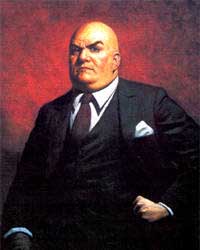
He is Emperor Palpatine. He is Goldfinger. He is Lex Luthor.
He is Evil. He is not misunderstood. He is not misguided. He is not morally confused. He is Evil.
He can be a woman, but it’s very rare. When he is a woman, she has no feminine qualities other than the ability to seduce… as a last resort.
He is intelligent. He is often more intelligent than the Hero (unless the Hero is a Competent Man, and even then it’s usually too close to call). He misuses his intelligence, however.
He is a sociopath. He likes to murder and he likes to cause suffering. This is his only true pleasure.
If he is wealthy, he will go out of his way to make sure you understand he’s wealthy. He is ostentatious in his enjoyment of wealth so as to cause envy in those around him. He uses his wealth to destroy others.
He is not a Thug. He does not like to fight (although he may be very good at it if required to). He prefers to win by his wits and his schemes. He prefers for other people to do his dirty business.
He does not love; he lusts and covets. If he desires someone (usually the Hero’s One True Love), it is not out of adoration or fondness; it is so that he can cage and ravish her.
Although he will invariably be defeated by the hero, his true downfall is from his own moral failings. He always creates the circumstances of his own downfall.
He has an endless supply of minions, thugs, patsies, and dupes, but he does not have friends or Sidekicks. He does not acknowledge the equality of anyone and he despises camaraderie of any sort.
The Mastermind is often ugly or disfigured, but he can also be very handsome. In either case, his twisted morality will make him ugly and unattractive to those who are virtuous.
He is a manipulator. He does not empathize with others, but he understands how others think well enough to bend them to his will. Words and emotions are his weapons.
He enjoys moral sophistry. He wants you to believe that he is not truly evil, and that you are not truly good, but he is lying. He knows that he is Evil and harbors no confusion or regret.
He does not believe in Good. He believes that those who are Good are deluded or weak. He doesn’t believe that the Hero would continue to be Good if the Hero were smart enough to open his eyes, but neither does he care.
He is hard to kill. You can destroy him again and again but he’ll usually escape at the last moment and Return Another Day. When you do actually kill him, however, it is a Cause for Celebration.
He is an atheist. It would be impossible for him to acknowledge a power greater than himself. If he does happen to "worship" Satan, it is only as a conduit for power.
Labels: Archetypes, Mastermind, Villain
Thursday, July 26, 2007
Screaming Beans
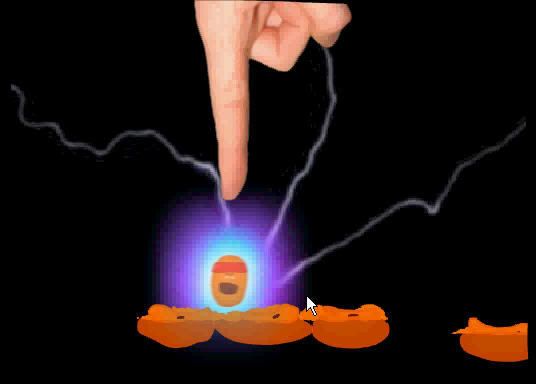
They are beans. They scream. You smoosh them.
Why do you smush them, like the finger of a wrathful god? Are they sinful beans? Is this a divine mercy to end their miserable existence? Do they annoy you? Is it just because?
It does not matter. Do no question the wrathful, smooshing finger of God.
Wednesday, July 25, 2007
Unstructured Archetypes: The Competent Man
 He is James Bond. He is Aragorn. He is Jack Ryan. He is Roland, the Gunslinger. He is Batman. He is also Lara Croft and Honor Harrington.
He is James Bond. He is Aragorn. He is Jack Ryan. He is Roland, the Gunslinger. He is Batman. He is also Lara Croft and Honor Harrington.
He can be a woman (see above), but only if she possesses all of the masculine virtues.
He is a hero. Make no mistake.
He is strong. Physically and emotionally.
He is tough. You can torture him. You can bereave him. You can not break him.
All things that he does, he does with perfection, whether it is tying a knot, building a fortress, or slaying his enemies -- especially slaying his enemies.
He is an expert is many things. He knows all things with respect to his profession and many other things besides. If he were interested in formal education, he’d have a hundred PhDs.
He went to the school of hard knocks. All of the important things he knows were learned the hard way.
He is loyal to his friends and loved ones. If you are hurt or killed, he will avenge you. Corollary: if you are a friend or a loved one, there’s a very good chance that you will need to be avenged.
He had a Mentor. That mentor might still be alive but is probably dead, and most likely requires avenging.
He is usually multilingual. He picks up new languages with ease.
He is a master of arms. If you give him a weapon, he’ll know how to use it. If you give him something that isn’t a weapon, he’ll know how to use it as a weapon. Of course, he can also kill you with his bare hands… or his teeth.
He’s moral but pragmatic. He doesn’t get tripped up by ethical dilemmas; his world lacks shades of gray. Even when his actions seem amoral, he’s fighting on the side of the angels, and don’t you forget it.
It goes without saying that he’s an excellent lover. He always brings his partners to the most intense climaxes of their lives. If he’s a man, he will have almost always have had many partners. Never the less, he will have a One True Love (and, rarely, an Other One True Love). That love will most likely have been killed.
Villains can be competent, but never as competent as The Competent Man. They are also doomed (even if they do, eventually, return).
He knows how to party, but he’s not a hedonist. He has no problem putting away his pleasures when the time comes to act, and that time is always soon.
He’s a survivalist. You can drop him in the middle of any environment with nothing at all and he’ll know how to forage and thrive.
He can be wounded, but never permanently crippled (even if he does lose a few fingers or a even a limb). Nothing can prevent him from being Competent.
He’s got few friends, which is probably for the best.
He is always the most handsome man (or most beautiful woman) in the room, even if his features are roughly hewn.
There is no competent missus. If, by some miracle, the competent man becomes married, and his spouse doesn’t get killed, his tenure as a Competent Man is over. He can, however, pass on his legacy to his son.
The Competent Man doesn’t take any shit. Don’t even think about it.
He’s got regrets, but nothing that a good avenging can’t take care of.
The Competent Man may be godly or agnostic. If he starts out as an atheist, he will not remain one.
Labels: Archetypes, Hero
Reboot! Unstructured Musings 2.0
You may have noticed that the blog looks a bit different, today. Actually, it's a lot different, but most of that difference should be invisible to you.
Awhile back, Blogger introduced a new 2.0 template with lots of features. Unfortunately, to take advantage of it, I needed to redo my CSS style-sheet from scratch, so I've been putting it off. I have finally taken the plunge. I've tried to retain most of the look and feel of the 1.0 blog, while taking advantage of some of the new features.
The biggest change is to comments. I'm now using the integrated comments that Blogger provides. This has quite a few advantages to me (not least being that when I get notifications, I'll be able to tell what post had had comments added). Sadly, this does mean that all of the old Haloscan comments are gone, which is disappointing since I've loved to go back an re-read them from time to time.
Other changes include a hierarchical archive of posts, which you can use to drill down to a given date and post, as well as a list of labels on the sidebar, which makes it much easier to navigate to topics. There's also a mail-to icon under each post so that now you can easily mail posts to friends (hint, hint).
There's still some tweaking to be done before I can get the design to quite where I want it, but I hope that you'll approve of the changes in the meanwhile.
Speaking of which, if you could take a moment to vote on the poll (see sidebar), I'd certainly appreciate it.
Labels: administrivia, blog
Tuesday, July 24, 2007
Unstructured Constellations
I grew up in the suburbs which is to say that I knew that there were stars in the sky, but they were never very bright. On those infrequent occasions where I got to sleep under a real night sky, I have always been amazed at how many stars there are to see.
The Night Sky is a neat, little instructional site that covers the basics of finding constellations. By the end of it, you'll be able to identify the constellations Orion, the Big Dipper, and Cassiopeia, as well as the particular stars Betelgeuse and Polaris (from which you can derive north).
Labels: astronomy, educational, interesting
Monday, July 23, 2007
Unstructured Slapping
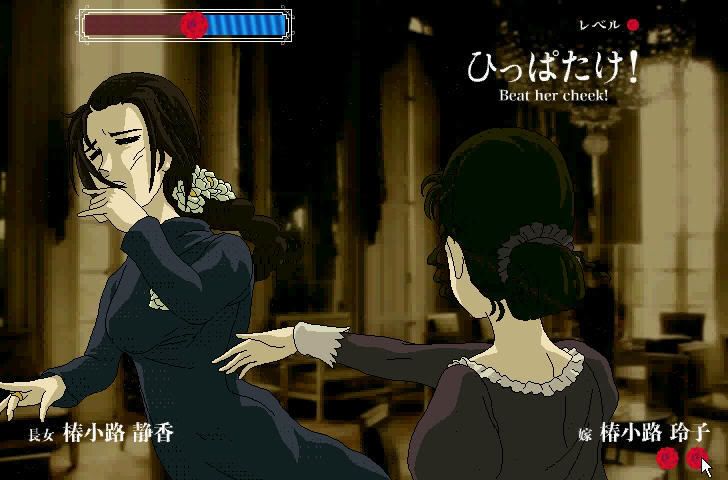
Exhibit 56,402,355 for the case that the Japanese are weird is the game Nigoro, a.k.a. "Rose & Camellia" wherein the player attempts to slap the hell out of another woman for reasons that are thoroughly lost in translation. 1
I'm not sure what actually disturbs me more: the existence of the game or the fact that there are YouTube videos demonstrating how far people have managed to get in the game.
1 Don't believe me? Here's Google's translation of the rationale.
Reiko who marries as a wife of the nobility and camellia path head of a family man Siyunsuke. The husband received breath in that following day. While the noble harassing [ri] of the people of the camellia path house continues, the blood of the populace in Reiko burns up. The rose is received in Siyunsuke in the chest, Reiko declaration of war was proclaimed to the people of the camellia path house. “I who am the wife of the eldest son receive the camellia path house.”...... This the women becomes gorgeous, it sways.
Sunday, July 22, 2007
Structured Fun
Labels: 1950's, mental hygiene, PSA
Saturday, July 21, 2007
Unstructured Clouds

Here's a very cool and creative collection of pictures that play around with clouds and forced perspective.
Labels: clouds, Cool, meteorology
Friday, July 20, 2007
The Roadrunner Rules
Mark Rosewater, who is one of the major creative forces behind Magic: The Gathering, has a saying that restrictions breed creativity. It would appear that Chuck Jones, who was arguably the driving force behind Warner Brother's Looney Tunes cartoons, would agree. Here are the nine rules which governed the creation of the Roadrunner and Coyote series of classic cartoons.
1. The Road Runner cannot harm the coyote except by going "Beep-beep!"
2. No outside force can harm the coyote—only his own ineptitude or the failure of the ACME products.
3. The coyote can stop any time—if he were not a fanatic.
4. There may be no dialogue ever, except "beep-beep!" The coyote may, however, speak to the audience, occasionally with his own voice or through wooden signs that he holds up.
5. The Road Runner must stay on the road—otherwise, logically, he would not be called "Road Runner".
6. All action must be confined to the natural environment of the two characters—the southwest American desert.
7. All materials, tools, weapons, or mechanical conveniences must be obtained from the ACME Corporation.
8. Whenever possible, gravity should be made the coyote's greatest enemy.
9. The coyote is always more humiliated than harmed by his failures.
(source: Chuck Amuck: The Life and Times of an Animated Cartoonist)
Labels: cartoon, interesting, loony tunes, roadrunner
Thursday, July 19, 2007
Wednesday, July 18, 2007
Unstructured Inspiration
When I write an essay, such as the recent one on Omnipresence, I like to think that I'm inspiring my readers in some way. Mind you, I wasn't expecting the inspiration to take quite this form.
Labels: funny, Miscellania, religion
Tuesday, July 17, 2007
Unstructured Bunny Rabbit
Ever since we saw a yeti throwing a penguin, there have been a glut of games where the goal is to make some animal traverse some large distance (horizontal or vertical). Be that as it may, this latest one, which involves an insanely cute bunny jumping on bells in an attempt to get high (quit your tittering, you!) is surprisingly fun, addictive and, yet, soothing.
Labels: bunny rabbit, cute, Fun
Monday, July 16, 2007
Administrivia
Just a few notes on some modifications that I've made to the blog. The first is that I've had complaints that it was very difficult to get back to the main blog if you open an articles Permanent URL link. I've added a "Return to Main Page" link which will show at the bottom of the page after the last article (obviously, this won't have much use on the actual main page, so it can be ignored, there).
I've also gone through all of the old posts and added context links, which makes it easy to find related articles. For instance if you wanted to see all of my old Administrivia posts (and why the hell would you do a crazy thing like that), you could just click on the Administrivia label at the bottom of this article.
I've also noted that all the old audioblogger links for my poems are now officially dead, which rather sucks given how much of a PITA it was to narrate them. I'm still looking for a good way to do audioblogging that won't cost me an arm and a leg. If you happen to know of a good option, do pass it along.
Labels: administrivia
Beer Activated Girl
With a title like Beer Activated Girl, you'd think that this parody of Coin Activated Boy would be utterly misogynistic but it actually manages to be rather sweet in an odd sort of way. Bonus points for using a cute, plus-sized model.
Sunday, July 15, 2007
On Omnipresence
The fact that I am an atheist who has an interest in theology isn't, in and of itself, surprising. In my entirely anecdotal experience, atheists, as a whole, tend to be more theologically away than the majority of theists. I suspect that this is explained by nothing so complex as basic philosophical self-defense: when you're constantly asked to justify your beliefs, it makes sense to understand the beliefs of your opponents.
Most atheists, however, tend to focus on the subject of theodicy, which pertains to arguments that attempt to establish the existence of God (and let's be clear about something here; the vast bulk of theology, as a school of thought, focuses on the Abrahamic religions). While I have engaged in that sort of debate and even gained a fair amount of enjoyment from it, I find that my interest in it has waned over the years. The truth of the matter is that there are only about a dozen interesting arguments, one way or the other, which maybe a half-dozen interesting permutations each. Once you've covered the ground, there's really not much more of interest to be found. Likewise, if you haven't been convinced (again, one way or the other) after having gone over them, then very little is likely to change your mind. My suspicion is that less than 1% of the people who study theodicy are ever compelled to change their initial position and that the bulk of theodicy, in practice, is an elaborate game of mental self-reinforcement by means of elaborate rationalization.
So, if I'm no longer interested in theology, you may well ask, then what remaining interest do I have in theology? The answer is that, for me, theology is an interesting mental exercise. Let us postulate that there exists a Perfect Being. Having postulated said being, what characteristics would such a being necessarily have (or necessarily not have)? The actual existence or non-existence of the being is as irrelevant to me as the existence or non-existence of ideal circles is to a geometer.
In traditional theology, there are four particular traits which are reserved exclusively to the Perfect Being: omnipotence, omniscience, omnibenevolence and omnipresence. Of the two, omnipotence and omniscience garner the bulk of the attention with omnibenevolence trailing a distant third and nearly no attention, what so ever, being granted to omnipresence. This isn't especially surprising because, as human beings, we tend to be attracted to those things that we would most like to possess. If you were granted one unconstrained wish I think that most people would opt for ultimate power (even if it did come with the caveat that you couldn't then use it to get any of the other omni-traits), that a smaller number of people would be tempted by ultimate knowledge (indeed, that's what I'd want); some small number of people (bless their hearts!) might choose to be perfectly benevolent, but who in the world would wish for the ability to be everywhere at once!? Be that as it may, of the four omnis, omnipresence may well be the most interesting.
Consider this: what exactly does it mean to be omnipresent? The encyclopedic definition is to be present at evey point in space and time (which, by the by, also implies that our Perfect Being is eternal). Putting aside for a moment that the Abrahamic god is usually considered to be immaterial, this would imply that the Perfect Being can not coexist with anything else. Indeed, the existence of other things would seem to contradict the presumption that a Perfect Being exists (thus leading us straight back to theodicy). Let us consider a couple of possible alternatives.
The first is what I call the Jell-O model of deity which is what I suspect most people imagine when (and if they think about omnipresence. In this scenario, the Perfect Being fits into all the empty parts of existence. The fact that you and I are also in the universe doesn't contradict its existence because it it adjacent to every occupied point. Indeed, the Perfect Being doesn't simply surround us, it permeats us. All the spaces btween the protons, electrons and neutrons that make up our body are part of its Body and if it's not everywhere, it's close enough not to matter. Not a swallow falls that It does not feel (indeed, omnipresence, in a strange sort of way, may well account for the Beings omnipotence and omniscience).
Aquinas favored a model of omnipresence that saw God as being omnipresent only in as much as God had knowledge of all things, the ability to act upon all things, and who was the source of all things. In the Aquinan view, God is the basis of all realty and has no limits with respect to that reality, thus, even though God is an Other with respect to the elements of the universe, His relationship to the universe justifies a claim of effective omnipresence.
I believe that this model has a basic flaw: we can imagine a universe occupied by a similar being to the one that occupies our own with a single difference: in this possible world, there exists one less electron. The being that occupies this infinitesimally distinct universe would have one more loci that the being that occupies our own. As such, this being would have an even greater degree of omnipresence than our own. Since perfection is an absolute (there are no degrees of Perfection), it would follow that the being that is in our universe could not, in fact, be a Perfect Being, QED. By a process of reductio ad absurdiam we quickly find ourselves back to the starting point: the only perfect being is one that excludes all other beings from existence.
A less naïve model might be something I call the Organic model of deity. In this model, the Perfect Being is, indeed, unitary. All things that exist are part of the Perfect Being in the same way that your heart, lungs and liver are all part of you even though they can also be considered discretely. A popular variant of this idea is that all things exist as part of the Mind of God and that everything we feel and experience are simply the thoughts of the Divine Awareness. Charles Hartshorn goes this one better by suggesting that the relationship of the deity to the universe is one of a mind to its body, which is to suggest that there is simultaneously a duality and a unity between the divine and the mundane.
Whether we treat existence as the Perfect Being's body or mind, however (or some combination thereof), we are face the difficulty of the fact that the elements of existence are imperfect. We are faced, as one example, with the problem of evil. If all things are part of the Perfect Being, and evil exists in the universe, then the implication is that part of the Perfect Being is evil and, thus, imperfect.
It is possible to get around this apparent paradox by proposing that the whole is greater than the sum of its parts. By this proposal, individual aspects of the Perfect Being can seem imperfect when viewed in isolation while, never the less, contributing to a perfect entity when viewed in the aggregate, much as a circle is composed of arc segments that, by themselves, lack the geometric perfection of the circle to which they are a part.
While this formulation does have a certain intellectual elegance, it is morally problematic. If the apparent imperfections that we find in existence are an illusion created by an insufficient perspective then so too is the apparent evil in the universe. If we embrace this view we find ourselves in the uncomfortable position of having to deny, for instance, that the rape of a ten year old girl is, in any sense of the word, wrong. I suspect that few people would be willing to believe that we live in such a Panglossian reality. Never the less, the position does seem to be logically tenable.
The final option is to make an appeal to Mystery which is to say that we simply declare that even though the omnipresence of the Perfect Being is a fact, our ability to understand that fact is limited by our capacity to comprehend the nature of that fact. The question is "answered" by declaring it unanswerable.
Again, this is a logically tenable position and there is precedence in theology to declare that certain things presumed to be factual are, never the less, imponderable (the Christian doctrine of the Trinity being the classic example). While such an answer might provide an anodyne to religious belief, I don't find this sort of solution to be intellectually satisfying. Remember, for me theology is an abstract intellectual exercise. As such, I don't gain much pleasure by proposing a problem and then by "solving" the problem by declaring it insoluble by fiat.
Of course, we might well ask whether or not omnipresence is a necessary characteristic of a Perfect Being. One could make an Anselmian argument that a being that is less than absolutely present is less perfect than a being that is fully present, however, such an argument carries within it a circular presumption that degrees of presence have anything more to do with perfection then texture or color (must we presume that the Perfect Being is absolutely chromatic – whatever that might mean?). Be that as it may, it's hard to shake the feeling that a being that is otherwise absolute in every other aspect, but which is limited in space and/or time, is, indeed, less than a perfect being.
Alternatively, since we can argue that the existence of a Perfect being necessary excludes anything else but itself from existence, we can arrive at an anti-theodic conclusion that the existence of other things is a demonstration that the Perfect Being does not exist.
My own suspicion is that our definition of Perfection may, indeed, be faulty. I think that perfection my imply Totality, which is to say that a Perfect Being would be a kind of superset (a class?) that necessarily included within itself all possible things. I think that such a being would not, and could not, have a personality or, indeed, any sort of unified sentience since awareness, itself, would only be a subset of the whole and that no thought or set of thoughts could be privileged above any other set of thoughts. Such a being would be all possible thoughts, all possible peoples, all possible places, and all possible events. Such a being would neither be good nor evil but fully contain both. Such a being would, in short, be nothing less than Existence: impersonal and absolute.
Labels: Essay, omnipresence, philosophy, theology
Saturday, July 07, 2007
The Zombie Food Pyramid
I'm always in the mood for good Zombie humor. This is something I stumbled on at Stacy Ponder's site.